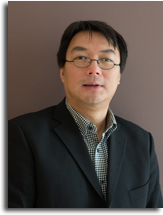Teaching Philosophy
I am honored to receive the Exemplary Teaching Award in General Education. This award not only recognizes my past efforts, it also brings me great encouragement and confidence to continue pursuing my future endeavors in teaching.
As a language specialist, one of my primary roles when I teach in a class is to act as a facilitator, guiding students to better understand Japanese culture, tradition and society through discussions and exchange of thoughts which help students develop their own important analysis about the topics and issues in both old-time and contemporary Japan. In addition to textual materials, I believe it is important for the students to have direct access to Japan's mass media platforms, including the visual aspect as well, so that they may experience and develop their own interest-driven ideas of what Japan is. The main points of my teaching philosophy are summarized as follows:
-
encouraging interest-driven motivation of the students as such that they can interpret Japanese culture and traditions through exposure to materials in their native language form, given that grammar and texts usually produce nuances that are important in Japan's unspoken ways of communication. It is important to convey to our students the message that "knowing others' culture means knowing more about ourselves";
-
encouraging the students to think critically and comment on the characteristics of Japanese culture and develop their own comparative analyses of cross-cultural understanding by both Japanese and Hong Kong speakers; and
-
encouraging the students to apply what they have learnt from the course materials to different scenarios and make their own judgments in various contexts and scenarios. My role as the course facilitator is to train the students to understand the complex nuances of culture through communication in the human society and the world around us.

I aim at generating enthusiasm for learning among my students by going through current affair topics from the Japanese media which mimic the daily information consumption of Japanese people. Through the use of selected news video clips from various news broadcasters in Japan and documentary relevant to the course syllabus (with Chinese subtitles provided by my colleagues and myself), a platform conducive to interaction and analytical discussion among my students will be built up. Case studies incorporating ideas from students in the class are then designed to provide opportunities for critical thinking. The prime objective of incorporating ideas from the class is to encourage those students who are comparatively passive in speaking in the native language to vocalize more about their opinions in class. Meanwhile, the writing part shall provide a channel for all to express their own views in the textual form. The essays which I review are then utilized for further discussions on the relevant topics. Critical thinking and opinion formation are not restricted only to verbal exchanges but also in the term-end research paper which is a venue for critical thinking and creativity supported by references and research. Through open and free discussion, my objective is to dispel "Japanese culture and society stereotypes" and allow students in the class to assume an active role in conceptualizing what "Japaneseness" and "Japan" are, and then to adopt comparative perspectives to analyze how they are different from our own culture and society. Pre-conceived ideas are now challenged constantly through different perspectives.

Last but not the least, the incorporation of research findings in my teaching is one of the most significant elements which provides a platform for me to share with my students the latest research outcomes in order to enhance their understanding of certain relevant topics in the course. For example, issues from research findings related to intercultural communication between people in Japan and Hong Kong are introduced as lecture materials.
My academic publication titled 《從日語看日本文化》 (Understanding Japanese Culture through Japanese Language) published in 2010 is specially written for my course and it is one of the five books in the current General Education series jointly published by the CUHK Office of University General Education and the Chinese University Press. This book has been used for a few years since it is first published and I believe that it caters to the learning needs of students taking my course.
|










